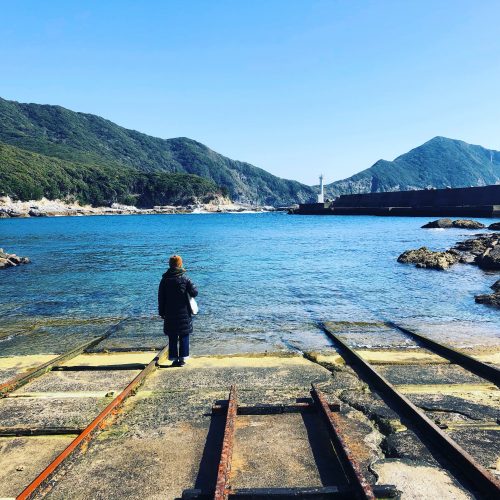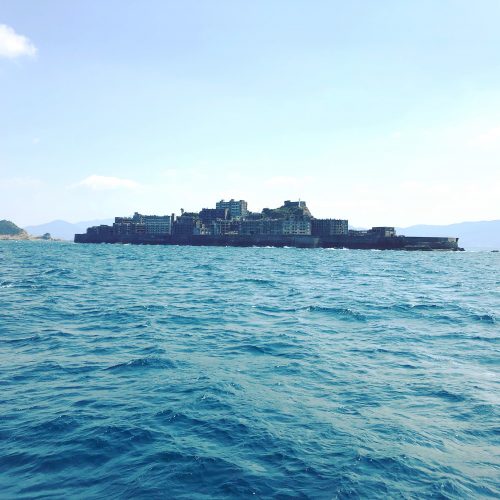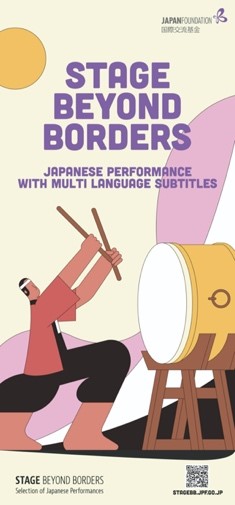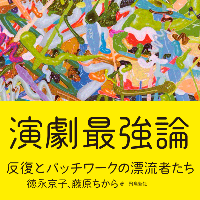【連載】これから演劇を始める人のための演劇入門 ENTRANCE=EXIT, FOR STARTING THEATER― 第3場 モビリティとグラヴィティ Mobility and Gravity
これから演劇
2019.04.4
*藤原ちからによる新連載。コンセプトについてはこちらをご覧ください。
*English is bellow the picture, you can translate into your language easily.
* * *
九州を旅しています。歴史上、朝鮮半島や中国大陸との国境と見なされてきたこの九州には、たくさんの島があり、島へ渡るためには海を越えなくてはなりません。フェリーの2等客室に荷物を放り出し、甲板から果てしない水平線を眺める時、わたしはあらゆる重力(グラヴィティ)から解放された移動力(モビリティ)を得たかのような錯覚に陥ります。トランクひとつだけで移動する旅は、たしかに軽やかでロマンティックです。けれどもそれは現実の生活と繋がっていて、ラップトップやスマートフォンさえ開けば、いつでもそこにオフィスが出現してしまう。生活に必要な資金の大部分を大都市からの仕事に頼っている以上、そこからの引力(グラヴィティ)を完全に遮断するのは難しいわけです。
今回はこの「モビリティ」と「グラヴィティ」について、これから演劇を始めるあなたと一緒に考えてみたいと思います。モビリティという言葉は「可動性、機動性、流動性、移動手段、気まぐれ」などを意味し、演劇についての議論でもよく使われています。一方のグラヴィティは「引力、重力、重さ、まじめさ」等を意味しますが、ここではひとまず「誰か/何かをある場所に結びつけようとする力」と定義しておきます。仮にあなたが、日本語しか使えないと思い込んでいたら「日本語圏のグラヴィティ」に捕らわれることになるでしょうし、東京でしか仕事できないと思い込んでいたら「東京のグラヴィティ」から抜け出ることは難しいでしょう。
* * *
演劇のアーティストやプロデューサーのモビリティが高まっていることは、世界的にすでに周知の事実と言っていいはずです。10年ほど前から演劇でも盛んになった滞在制作=アーティスト・イン・レジデンス(AIR)をはじめとするいくつかの要因によって、アーティストが一時的にみずからの拠点を離れて別の土地に滞在することは珍しくなくなりました。すでにつくった作品をツアーさせるのとは違って、AIRではアーティストがその地域により深くコミットし、その土地の歴史や物語を題材にしたり、地域住民を巻き込んだプロジェクトになることもよくあります。
しかしこのAIRが普及していった10年間において、アーティストがグラヴィティから逃れて自由になったのかというと、そうではなく、むしろ新たなグラヴィティに直面することになりました。地域住民やコミュニティとどのような関係を生み出すか、という問題が生じたからです。今回はこの複雑な問題には踏み込みませんが、アーティストが傷つくような事例もわたしはいくつか目にしてきました。各地域にあるグラヴィティとどのように生きていくか、アーティストそれぞれが試行錯誤してきたのではないでしょうか。
ここで押さえておきたいのは、モビリティの獲得によってグラヴィティを回避できると考えるのは幻想にすぎない、ということです。地球上のあらゆる場所にそれぞれ固有のグラヴィティがある。しかもラップトップやスマートフォンを通して、それは地の果てまで追ってくるでしょう。
では、あなたならどうするでしょうか? いっそモビリティを捨てて、単一のグラヴィティと向き合うことに徹するでしょうか? そのほうが、シンプルで幸せな演劇ライフを送ることができるかもしれません。単一のグラヴィティの圏内に留まって中心的なポジションを目指すほうが、地位やお金や権力には近道かもしれない。
しかし、この10年で身体を張って試行錯誤してきたアーティストたちは、むしろ別の道を選び始めたように見えます。彼らは重要なテーマをモチーフを追いながらも、その軽やかなフットワークゆえに、一種の遊び人(ホモ・ルーデンス)にも見えるかもしれません。モビリティが「気まぐれ」、グラヴィティが「まじめさ」という意味を持っていることを思い出してください。彼らはモビリティとグラヴィティのバランスの中で生きています。それは長い旅のようでもあります。彼らは演劇活動を通して各地を訪れ、複数の土地のグラヴィティと関わり、結果として、帰ることのできる場所(誰かが待っている場所)をいくつか手に入れることになりました。もしかすると「あなたの拠点はどこですか?」というシンプルな問いにさえ、彼らはうまく答えられないかもしれません。なぜなら彼らは複数のグラヴィティの影響を受けながら、それらの「はざま」に生きているからです。都会と島とのあいだに。いくつかの地方都市のあいだに。この国とあの国のあいだに……。言語、時計、法律、宗教、習慣……この世界にはいろんな差異がありますが、彼らが生きるのはその「はざま」です。ひとつだけの場所ではないのです。もしあなたが彼らの家を探索すれば、複数の異なる国の貨幣を見つけることになるかもしれません。ただし、彼らがまだ「家」と呼べるものを持っていればの話ですが……。
演劇のアーティストが複数のグラヴィティの「はざま」に生きるようになったということは、当然、作品の内容にも影響していくでしょう。単一のグラヴィティに従属するだけでは追い切れないようなテーマやモチーフを、これからの演劇は扱っていくことになるのではないでしょうか。それはこれから演劇を始めるあなたにとっても無縁ではないはずです。あなたはこれからどこに生き、何を見て、どんな演劇を始めるのでしょうか?
わたし自身、今回の九州の旅で複数のグラヴィティに触れて、その「はざま」にあるいろんなものを発見したように感じています。例えば対馬、壱岐、平戸、出島、端島(軍艦島)といった島々を訪れたことによって、「島」というものに対する考え方が大きく変わりました。「日本は島国だ」とよく言われますが、この言葉は多くの場合、閉鎖的であるという意味のメタファーであり、「島」は孤立した閉ざされた場所だとイメージされがちです。けれども「島」は、実は行き止まりではなく、どこかからどこかへの通り道でもあるのではないでしょうか? そしてこの事実は小さな「島」にかぎらず、どんなに巨大な大陸に対しても同じように言えるはずです。あらゆる土地は通り道であり、誰か/何かがかつて通り過ぎた場所であるのだと……。つまりどんなに強固なグラヴィティを発する土地にも、必ず、過去のモビリティの痕跡があるのです。この考えは、グラヴィティを解体し、新たな視野を手に入れるための糸口になるかもしれません。
さて、最後にクエスチョンです。よかったらハッシュタグ #korekara_Q を付けてSNSで答えてみてくださいね。
Q1)あなたはどこを拠点にしたいと思いますか?(複数でもオッケー)
Q2)なぜそう思いますか?

As I continuing my journey, I’m in Kyushu area, the western part of Japan. Historically this Kyushu area has been regarded as the borders with the Korean peninsula and the Chinese continent. There are many islands here, and it’s necessary to cross the sea to reach those islands. When I throw my luggage into the second-class cabin of the ferry and look at the infinite horizon from the deck, I fall into an illusion as if I am freed from any gravity and get mobility. A journey with only one trunk is certainly light and romantic. But it’s still tied to real life, and if I open my laptop or smartphone, my office will always appear there. It’s difficult to completely block the gravity because most of the funds needed for my life depend on the work from metropolises.
In this article, I would like to think about this “mobility” and “gravity” with you who will start theater from now on. The word “mobility” is already often used in discussions about theater. And about the other word “gravity”, for the moment I will define it as “force to connect someone/something to a certain place”.If you blindly believe that you can only use Japanese language, you will be caught by “the gravity of Japanese-speaking area”, or if you think that you can only work in Tokyo, it will be difficult to get out of “the gravity of Tokyo”.
* * *
The rise of mobility of theatrical artists and producers is a well-known fact already in the world. Due to several factors such as Artist-in-Residence (AIR) which has been popular in theater scene since about 10 years, it became usual for artists to temporarily leave their base and stay in another place. Unlike a tour with repertoire works, in AIR artists often commit more deeply into the local area. Their projects dig the histories and stories of the local area as subjects and sometimes involve the local people.
But, in the 10 years of these AIR, it was not that they were freed from any gravity, but rather they were facing new gravity. The problem arose as to what kind of relationship to create with the local people and communities. I will not go into this complex issue deeply by this article, but I have seen some cases where the artist gets hurt. Each artist has tried and failed how to live with the gravity in various local places.
I would like to emphasize the fact that it’s only an illusion if you think you can avoid gravity by acquiring mobility. Everywhere on the earth has its own gravity, and through laptops or smartphones, it tracks you to the edge of the earth.
So what do you do? Do you just throw away your mobility and focus on facing a single gravity? That might be going to lead you to a simple and happy theater life. When you stay in a single gravity and aim for a central position, it may be a shortcut for status, money and power.
However, it seems that artists who have been trial and error in the past 10 years have rather started to choose another way. They follow important themes and motifs, but they may also look like a kind of playful person (homo ludens) because of their light footwork. Please remember that “mobility” has the meaning of “windy” and “gravity” has the meaning of “seriousness”. They live in a balance of mobility and gravity. It’s also like a long journey. Through theatrical activity, they have visited many places and been involved in the gravity of several lands, finally they got some places where they could go home (where somebody is waiting for them). Perhaps they may not be able to answer the simple question; “Where is your base?” Because they are influenced by multiple gravity and live in the “gap” between them. Between a metropolis and an island. Between several local cities. Between this country and that country… In the world, there are many differences between languages, clocks, laws, religions, customs, and so on. They live in the “gap”, not just in one place. If you explore their homes, you may find currencies of several different countries. However, if they still have something they can call “home”…
Of course the fact that theatrical artists are now living in the “gap” of multiple gravity will also affect the content of their works. From now on, theater will be dealing with themes and motifs that can not be overtaken only by subordinating to a single gravity. It should also affect you who will start theater from now on. Where do you live, what do you see, what kind of theater do you start?
For me, in this journey to Kyushu area this time, I’ve touched several gravities and discovered various things in the “gap”. For example, when I visited islands of Tsushima, Iki, Hirado, Dejima, and Hashima (Gunkanjima), the experience changed my mind about “island. Some people often says “Japan is an island country”. It’s described as a metaphor that means insular. “Island” is often viewed as isolated and closed places. However, actually it’s not a dead end, but a path from somewhere to somewhere. And this fact is not limited to small “islands”, it should be the same for huge continents. Every land is a path where someone/something has passed by. In other words, no matter how strong gravity lands, there are always traces of past mobility. This idea may be a clue to deconstruct gravity and gaining a new perspective.
At the end, there are questions. Please answer on your social media with a hashtag #korekara_Q
Q1) Where do you want to be based? (Multiple is OK)
Q2) Why do you think so?




